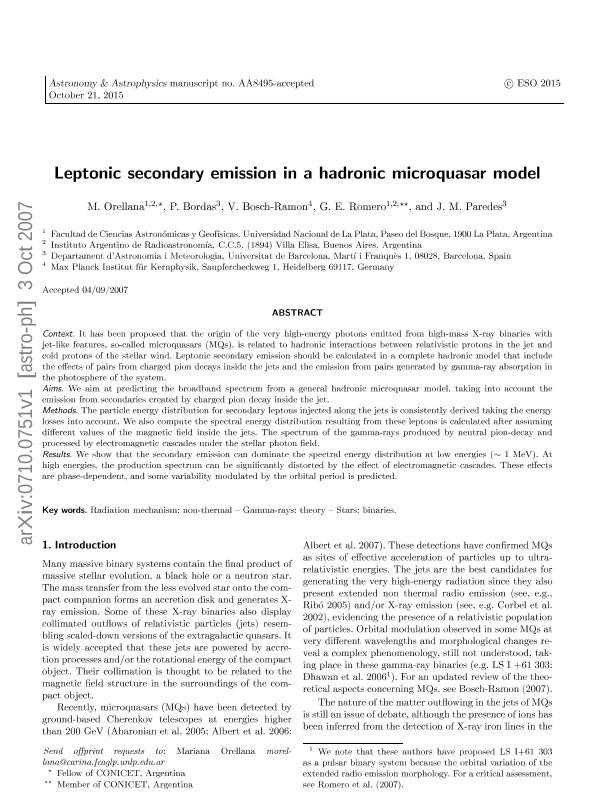Mostrar el registro sencillo del ítem
dc.contributor.author
Orellana, Mariana Dominga

dc.contributor.author
Bordas, Pol
dc.contributor.author
Bosch Ramon, Valentí

dc.contributor.author
Romero, Gustavo Esteban

dc.contributor.author
Paredes, Josep Maria

dc.date.available
2017-11-30T17:13:15Z
dc.date.issued
2007-12
dc.identifier.citation
Orellana, Mariana Dominga; Bordas, Pol; Bosch Ramon, Valentí; Romero, Gustavo Esteban; Paredes, Josep Maria; Leptonic secondary emission in a hadronic microquasar model; EDP Sciences; Astronomy and Astrophysics; 476; 1; 12-2007; 9-15
dc.identifier.issn
0004-6361
dc.identifier.uri
http://hdl.handle.net/11336/29338
dc.description.abstract
Context. It has been proposed that the origin of the very high-energy photons emitted from high-mass X-ray binaries with jet-like features, so-called microquasars (MQs), is related to hadronic interactions between relativistic protons in the jet and cold protons of the stellar wind. Leptonic secondary emission should be calculated in a complete hadronic model that include the effects of pairs from charged pion decays inside the jets and the emission from pairs generated by gamma-ray absorption in the photosphere of the system. Aims. We aim at predicting the broadband spectrum from a general hadronic microquasar model, taking into account the emission from secondaries created by charged pion decay inside the jet. Methods. The particle energy distribution for secondary leptons injected along the jets is consistently derived taking the energy losses into account. We also compute the spectral energy distribution resulting from these leptons is calculated after assuming different values of the magnetic field inside the jets. The spectrum of the gamma-rays produced by neutral pion-decay and processed by electromagnetic cascades under the stellar photon field. Results. We show that the secondary emission can dominate the spectral energy distribution at low energies ( ∼ 1 MeV). At high energies, the production spectrum can be significantly distorted by the effect of electromagnetic cascades. These effects are phase-dependent, and some variability modulated by the orbital period is predicted.
dc.format
application/pdf
dc.language.iso
eng
dc.publisher
EDP Sciences

dc.rights
info:eu-repo/semantics/openAccess
dc.rights.uri
https://creativecommons.org/licenses/by-nc-sa/2.5/ar/
dc.subject
Radiation Mechanisms
dc.subject
Gamma Rays
dc.subject
Binary Stars
dc.subject.classification
Astronomía

dc.subject.classification
Ciencias Físicas

dc.subject.classification
CIENCIAS NATURALES Y EXACTAS

dc.title
Leptonic secondary emission in a hadronic microquasar model
dc.type
info:eu-repo/semantics/article
dc.type
info:ar-repo/semantics/artículo
dc.type
info:eu-repo/semantics/publishedVersion
dc.date.updated
2017-10-12T19:38:11Z
dc.journal.volume
476
dc.journal.number
1
dc.journal.pagination
9-15
dc.journal.pais
Francia

dc.journal.ciudad
Les Ulis Cedex A
dc.description.fil
Fil: Orellana, Mariana Dominga. Provincia de Buenos Aires. Gobernación. Comisión de Investigaciones Científicas. Instituto Argentino de Radioastronomía. Consejo Nacional de Investigaciones Científicas y Técnicas. Centro Científico Tecnológico Conicet - La Plata. Instituto Argentino de Radioastronomía; Argentina
dc.description.fil
Fil: Bordas, Pol. Universidad de Barcelona; España
dc.description.fil
Fil: Bosch Ramon, Valentí. Max Planck Institut für Kernphysik; Alemania
dc.description.fil
Fil: Romero, Gustavo Esteban. Provincia de Buenos Aires. Gobernación. Comisión de Investigaciones Científicas. Instituto Argentino de Radioastronomía. Consejo Nacional de Investigaciones Científicas y Técnicas. Centro Científico Tecnológico Conicet - La Plata. Instituto Argentino de Radioastronomía; Argentina
dc.description.fil
Fil: Paredes, Josep Maria. Universidad de Barcelona; España
dc.journal.title
Astronomy and Astrophysics

dc.relation.alternativeid
info:eu-repo/semantics/altIdentifier/doi/http://dx.doi.org/10.1051/0004-6361:20078495
dc.relation.alternativeid
info:eu-repo/semantics/altIdentifier/url/https://www.aanda.org/articles/aa/abs/2007/46/aa8495-07/aa8495-07.html
Archivos asociados
